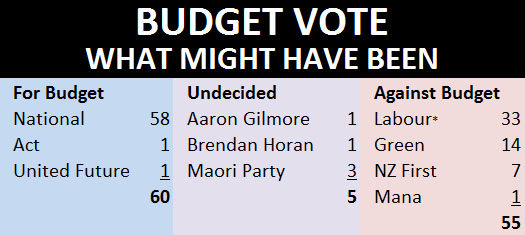Aaron Gilmore debacle put Budget at risk
UPDATED with table.
UPDATED with table.
In the end, he left with some integrity.
Had he wanted to, Aaron Gilmore could have created a confidence and supply crisis, and the whole debacle has again underlined the precariousness of governments under MMP.
Despite thumping Labour in 2011, John Key has been able to pass legislation only with the support of either the Maori Party or both Act and United Future.
Mr Key having that second option gives the Maori Party the political cover it needs to remain part of the government. But both it and National know that if its votes were ever the difference between a National- or Labour-led government, the pressure on it to opt for the latter would be enormous.
Mr Gilmore knows it too. Had he played silly buggers by remaining in parliament but putting his vote in doubt, National, Act and United Future could not have passed the Budget on their own. The Maori Party’s votes would have become essential and it would have felt an obligation to its constituents to press for further policy wins.
No doubt disgraced former NZ First MP Brendan Horan would also have entered the game. Bill English could not have been confident of passing his Budget and it may even have needed to be put on hold while he and Mr Key negotiated to get one of the Maori Party, Mr Gilmore or Mr Horan over the line.
That would have inspired as much confidence in the integrity of New Zealand's political processes as Jenny Shipley’s morning teas with Alamein Kopu.
In fact – however insensitive it is to say so – such a scenario would have been worse were Labour not down one following Parekura Horomia’s passing.

* Without the late Hon. Parekura Horomia
MMP is to blame for making even an overwhelmingly popular prime minister’s hold on power so precarious.
Ironically, of course, Mr Key’s decision not to oppose MMP is to blame for its survival.
Goose MPs
We cannot, however, blame MMP for delivering gooses as MPs.
There were plenty of those under the old, equally discredited, first-past-the-post system (FPP). National’s Gilbert Myles? Labour’s John Kirk?
The difference is that, while it wasn’t impossible, such individuals were far less able to get themselves in the position of having leverage because FPP tended to deliver more secure majorities than the fragile coalitions since 1996 under MMP.
What also sticks in the craw is that, under FPP – or the thinking person’s alternative, Single Transferable Vote – when MPs rebel they at least still have a full time job representing a constituency.
It is the possibility of independent list MPs that is particularly repugnant.
Despite this, giving party leaders the right to fire rebel MPs would be worse.
Were a government to break manifesto promises, all MPs – even list MPs – must be free to protest without fear of expulsion. In fact, any National MP should be able to criticise, say, Mr Key’s superannuation guarantees without him being able to kick them out. As should Labour MPs wanting to criticise, say, interest-free student loans.
More important is party members being more rigorous in their selection processes, from the earliest stage through to list ranking.
As it happens, I was a member of National’s list ranking committee in the lead up to the 2005 election.
Our Auckland delegation – enthused by the new spirit of meritocracy after Don Brash had rolled Mr English – took our role seriously, meeting beforehand to share ideas.
At the meeting, however, Dr Brash showed up with then party president Judy Kirk, who kindly provided the committee with strong and helpful guidance that the list should be exactly as Dr Brash had ranked the caucus.
Suddenly, all the senior party figures decided that was such a good suggestion that they all fell happily in behind.
It is undoubtedly like that in all parties, except perhaps the Greens. Who believes that anyone other than Winston Peters is really involved in writing the NZ First list?
The most important lesson from the Gilmore affair is that all those involved in candidate selections – from individual electorates through to list-ranking committees – need to take their responsibilities much more seriously to prevent the next Mr Gilmore from harming their parties and themselves.
Sign up to get the latest stories and insights delivered to your inbox – free, every day.